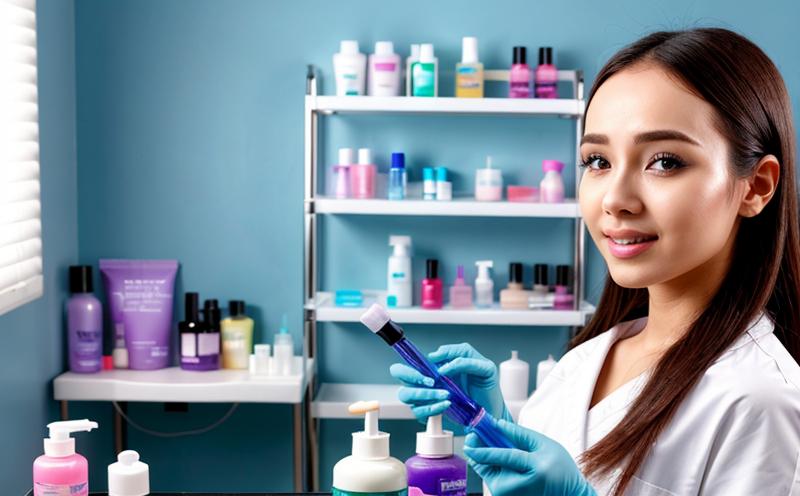EP 2.6.13 Testing for Specified Microorganisms in Cosmetics
The European Pharmacopoeia (EP) 2.6.13 specifies a method for the testing of specified microorganisms in cosmetics and personal care products. This stringent test ensures that cosmetic products do not contain harmful or undesirable microorganisms, thereby safeguarding consumer health and maintaining product integrity.
Microbial contamination can have severe consequences, including allergic reactions, infections, and deterioration of the product's shelf life. Compliance with EP 2.6.13 is mandatory for manufacturers seeking to sell their products within the European Economic Area (EEA). This service provides comprehensive testing to ensure that your cosmetic formulations meet these stringent regulations.
The test protocol involves the isolation and identification of specified microorganisms such as Staphylococcus aureus, Pseudomonas aeruginosa, Escherichia coli, and Candida albicans. The process includes:
- Sample preparation: Homogenization and dilution to ensure accurate inoculation.
- Culture media: Use of appropriate selective and non-selective media for growth.
- Incubation: Controlled conditions to facilitate optimal microbial growth.
- Identification: Utilizing biochemical tests, PCR, or mass spectrometry for precise identification.
The results are reported in accordance with the European Pharmacopoeia guidelines. This service ensures that your products meet the highest safety and quality standards required by regulatory bodies.
| Specified Microorganisms | Safety Concerns |
|---|---|
| Staphylococcus aureus | Potential cause of skin infections and allergic reactions. |
| Pseudomonas aeruginosa | Highly resistant to antibiotics, leading to severe infections. |
| Escherichia coli | Indicates fecal contamination and potential health risks. |
| Candida albicans | Common cause of yeast infections in humans. |
This testing ensures that your products are safe for consumers, comply with regulatory standards, and maintain a positive reputation within the industry. By adhering to EP 2.6.13, you demonstrate commitment to quality and consumer safety.
Industry Applications
This testing is crucial across various segments of the cosmetics and personal care industries:
- Balms and salves: Ensuring that products do not contain harmful microorganisms like Pseudomonas aeruginosa.
- Gels and lotions: Guaranteeing that these products are free from Staphylococcus aureus to prevent skin infections.
- Shampoos and conditioners: Preventing the presence of Escherichia coli which could indicate contamination issues.
| Industry Segment | Microorganism | Regulatory Requirement |
|---|---|---|
| Balms and salves | Pseudomonas aeruginosa | EP 2.6.13 |
| Gels and lotions | Staphylococcus aureus | EP 2.6.13 |
| Shampoos and conditioners | Escherichia coli | EP 2.6.13 |
The results of this testing are essential for ensuring that products meet the regulatory requirements set forth by bodies such as the European Pharmacopoeia.
Why Choose This Test
- Regulatory Compliance: Ensures compliance with EP 2.6.13 and other relevant regulations, safeguarding your brand's reputation.
- Consumer Trust: Demonstrates commitment to quality and consumer safety, enhancing trust among customers.
- Risk Management: Identifies potential risks early, allowing for corrective actions before they impact the market.
- Data Integrity: Provides reliable data that can be used in product development and improvement processes.
The benefits of adhering to EP 2.6.13 are numerous, including enhanced consumer confidence and a robust regulatory compliance framework. This testing is an investment in your brand's future success.
Environmental and Sustainability Contributions
Incorporating rigorous microbial testing into your production process not only ensures product safety but also contributes positively to the environment:
- Eco-Friendly Ingredients: By ensuring that microorganisms do not contaminate products, you can use eco-friendly ingredients without compromising safety.
- Reduced Waste: Early detection of contamination helps prevent batch rejections and waste generation.
- Energy Efficiency: Efficient testing processes minimize resource consumption and reduce energy usage.
Our laboratory uses state-of-the-art facilities to ensure that your products are not only safe but also environmentally responsible. By choosing this service, you contribute to a more sustainable future for all stakeholders involved in the cosmetics industry.





